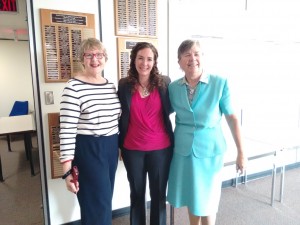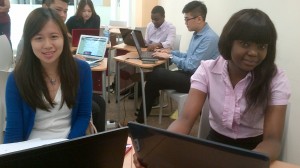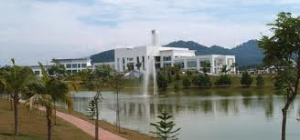I hav e had a string of excellent research assistants, but my current teammate is beyond excellent. Emmanuelle Fick is not just a PhD student, she is an English instructor in George Brown’s construction faculty ensuring that our next generation of city builders can find jobs, develop reports and succeed in the knowledge economy. Emmanuelle was also active in the recent strike and helped me to understand the issues that drove it. Read our piece here http://www.universityworldnews.com/article.php?story=20180124083515112&query=karram
e had a string of excellent research assistants, but my current teammate is beyond excellent. Emmanuelle Fick is not just a PhD student, she is an English instructor in George Brown’s construction faculty ensuring that our next generation of city builders can find jobs, develop reports and succeed in the knowledge economy. Emmanuelle was also active in the recent strike and helped me to understand the issues that drove it. Read our piece here http://www.universityworldnews.com/article.php?story=20180124083515112&query=karram
Category Archives: Uncategorized
The Wrong Side of History
My top conference pick has always been the Worldviews Conference jointly offered by OCUFA, University World News and OISE. The conference looks at the relationship between media and higher education bringing together journalists who are awesome story tellers and academics who tell us what the stories mean. Since conference only happens every three years, we keep the fires burning with an annual lecture. Peter Scott joined us this year and you can read my summary of his talk here. http://www.universityworldnews.com/article.php?story=20170417182241756
Successful Defence!
 I returned from maternity leave in the summer and jumped right into the intensity of defending my dissertation. On September 21, 2016 I passed without revisions – a rare event and more than I could ask or imagine. The credit for the pristine final draft goes to my committee members, who provided extensive feedback last spring and to my mom, Joanne Karram, who edited my thesis four times!! Perhaps the best part of the whole journey was eating ice cream in celebration with my dear committee members Dr. Ruth Hayhoe, Dr. Jane Knight and. Dr. Monica Heller.
I returned from maternity leave in the summer and jumped right into the intensity of defending my dissertation. On September 21, 2016 I passed without revisions – a rare event and more than I could ask or imagine. The credit for the pristine final draft goes to my committee members, who provided extensive feedback last spring and to my mom, Joanne Karram, who edited my thesis four times!! Perhaps the best part of the whole journey was eating ice cream in celebration with my dear committee members Dr. Ruth Hayhoe, Dr. Jane Knight and. Dr. Monica Heller.
You can watch my mock defence presentation at the following link – http://connect.oise.utoronto.ca/p5e8zryivr4/?launcher=false&fcsContent=true&pbMode=normal
START WATCHING AT 10 MINUTES – 10:00:00
Research Profile from UT
Thanks to Terry Lavender and Johnny Guatto at University of Toronto’s communication office for this nice piece on my research. It was great working with you both!

http://news.utoronto.ca/what-happens-when-non-western-students-attend-western-universities
Feeling lonely abroad?
A close friend of mine has just started a 2-year master’s degree in China. When she arrived a month ago she did not know anyone. But she was committed to talking to each person she met and accepting all the invitations for she received for social events. I am so impressed with her bravery and focus on meeting people, not just viewing places. In honour of her – I am re-posting my CBIE blog from http://istudentcanada.ca/four-strategies-making-real-friends-abroad/
Studying abroad has the potential to start friendships that will last a lifetime. Too often, however, students who do a semester or year overseas are criticized for only spending time with those who are like them, those who speak the same language or are from the same country. In many ways this is understandable. Every day is a steep learning curve as you try to keep up with your program (possibly in another language), navigate a new city and survive on new foods. These areas of learning need to be prioritized and it can be easy to only work on these, assuming that relationships will just happen naturally. But relationships take the same sort of intentional effort as learning a new transit system and the results are much more rewarding. Here a few easy strategies to assist you with making friends while studying abroad:
- Sip your tea slowly. Find out where authentic relational moments occur and join in. If you’ve read Three Cups of Tea or Eat, Pray, Love, you know what this means. Doing it, however, may take you out of your comfort zone. The first step is to look around you and ask “where are people getting to know each other?” It might be a tea shop near campus in Asia or playing chess after the sunsets in Africa.
- Become a creature of habit. Once you’ve identified where people seem to be connecting – join in, and join in often. While you might be interested in sampling the espresso at every cafe in town, real relationships take time to develop and meaningful connections are made when you show up day after day, get to know the staff and become local.
- Think people, not places. It is normal to want to travel every weekend and make the most of your close proximity to new cities and tourist sites, but challenge yourself to spend two weekends every month accepting (or giving) invitations to events in your city. Postpone the trip to Monaco if it means attending your host brother’s birthday party.
- Adventure two by two. Though it is important to avoid having only Canadian friends, there is no reason for you to make this quest for authentic relationship entirely by yourself. Look out for another study abroader who also wants to genuinely tap into the culture. Make a plan together to change the way you do your time abroad and foster friendships that will last a
International degrees transform students into leaders
After my extensive interviews with Malaysian students who attend UK or OZ branch-campuses, it was very evident that these students have experienced a radical transformation. Every student I spoke with expressed how different university was from high school – specifically the emphasis on groupwork and communication skills. The exam-based, memorization-style learning of their high schools was completely uprooted in their first year of university. However, final year students reflecting back, had a thousand positive anecdotes to share about how they had learned to deal with conflict, manage people and were more articulate as a result of their degree. Read more about these findings in my recent University World News blog http://www.universityworldnews.com/article.php?story=20140527161909570
Obama In KL
It is fitting that US President Obama’s critique of Malaysia’s racial and religious discrimination took place on Sunday at a university. The Universiti of Malaya, which hosted the President at a townhall meeting for students from the Youth South Asian Leaders’ Initative, offers few spaces for non-Muslim students and is a clear example of the nation’s unequal policies. Yet Malaysia will need more than Obama’s inspiring words to reshape a higher education system in which students’ enrollment is determined by their ethnicity.
Malaysia has an official policy of multiculturalism, established at its founding in 1957 and granting citizenship to the ethnic Malay, Chinese and Indians groups alike. But pro-Muslim, Malay leaders have held power for several years limiting the position of non-Muslim citizens. The result of these polices for Malaysia’s higher education is a system that is starkly divided along ethnic lines. At the same time, Malaysia is increasing as a destination country for international students and foreign programs.
The system is complex and diverse. At the publically-funded universities such as the Universiti Malaya, quotas limit how many non-Malay, non-Muslims are enrolled. Though these policies are designed to provide access to low-income Malays, in reality they alienate the country’s Chinese and Indian minorities. In the 1980’s the growing Chinese middle class responded by establishing their own successful, private universities. Institutions like the Universiti Malaya are directly linked to Chinese cultural and lobby groups. Others like HELP University have entered into franchise or twinning agreements with overseas universities to offer an extensive range of degrees.
Though Malaysia’s public universities have restricted access for all citizens, the government has intentionally developed policies to encourage cross-border education by promoting branch-campuses and twinning programs. Institutions like Nottingham University have established full campuses in Malaysia, drawing students from the all ethnic backgrounds. Many of country’s best students – barred from the federal universities – and skeptical of the local start-ups – head to international programs run by UK and Australian schools.
For the past two decades, this unique mix of private, local and international programs has filled the gap created by the governments’ ethnic quotas. Indeed the private system is so established, that the public universities have become marginalized and are less prestigious for students to attend. Malaysia’s public universities would benefit from Obama’s advice. In their case, changing the admissions policies is less about educating marginalized individuals and more about the quality of the institutions. By excluding top students, the federal universities have decreased their reputation. Rather they may wish to enroll students based on merit to reposition themselves as prestigious universities, while supplementing the at-risk populations with scholarships and accessible tuition.
Branch-Campuses
I have been quite amazed at the differences between the institutions that are self-identifying as “branch-campuses.” Some are just a few classrooms rented in an office building while others have beautiful white-washed buildings with landscaping, ponds and student-life space. Certainly, there has been a lot of talk about how sustainable branch-campuses are and how soon they will all shut down. But as heavy investments are matched with an increase in student enrollment, it seems that many are here to stay.
You can read some of my views on branch-campuses at University World News
Branch-campus students thrive on high-stakes competition: http://www.universityworldnews.com/article.php?story=20140309155504422
Protege to peer: Measuring maturity at branch campuses: http://www.universityworldnews.com/article.php?story=20140408150224295
Here is my beautiful daughter – helping me pack for our fieldwork adventure. This fall was monumental. With a lot of childcare support from my mom and wonderful neighbour Olga I defended my thesis proposal on October 30th. My dear supervisor Ruth Hayhoe was very diligent in editing my ethics forms and (in what can only be described as a miracle) it only took 3 weeks to receive approval from the University of Toronto. This evening we leave for Dubai, UAE to research the student experience at British branch-campuses. Childen’s Ministry Coordinator – FINAL – March 3 2015
Worldviews 2013 Conference – Toronto
Tonight is the opening keynote for the Worldviews 2013 conference. Adrian Monck (World Economic Forum) is speaking on public trust in the media and how this affects higher education. The conference investigates the relationship between higher education and the media – issues of MOOCs, knowledge mobilization, internationalization and more… Thursday and Friday’s sessions look great – I will personally be attending talks on journalism and education hubs. Full agenda here




